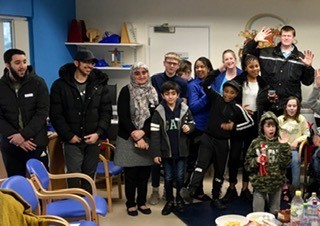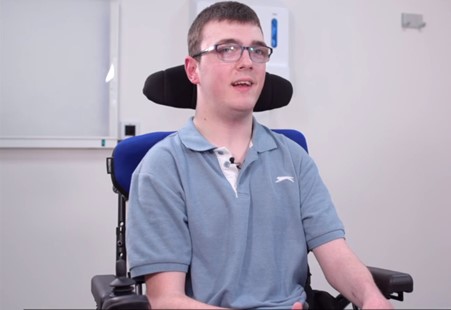Transition: Moving into adult care
Supporting you in your journey from children’s services into adult services

What is Transition?
In healthcare, we use the word “transition” to describe the process of preparing, planning and moving from children’s services to adult care. Transition is a gradual process that gives you, and everyone involved in your care, time to get you ready to move to adult services and discuss what your healthcare needs as an adult are likely to be. This includes deciding which services are best for you and where you will receive that care.
Transition is about making plans with you - and not about you.
We understand that moving away from a team of doctors and nurses that you have been with for many years can be scary but hopefully, by getting involved in the transition process, you will feel more confident and happier about the move.

Transition to Adult Services - Andrew's Journey - YouTube Video
Why do I have to move?
As you get older, you will find that some of the things you want to discuss or some of the care you might need is not properly provided by our children’s services. Adult services are used to dealing with all sorts of issues that may arise, such as higher education, travelling, careers and sex. You may also find that you would prefer to be seen in a more grown-up environment, rather than the usual children’s departments or wards.
When do I have to move?
There is no exact time that is right for everyone. The purpose of this leaflet is to get you thinking about moving on and preparing for it. Your doctors and nurses may have an idea about when they feel that you might be ready, but it is important that you are involved in that decision.
Can I choose where I move to?
Part of the transition process should be helping you to look at where your on-going healthcare needs can best be met and how this will fit in with your future plans. Your consultant or family doctor (GP) will be able to give you information to help you make the best decision. If there is a choice of places, it is a good idea to visit all of them and then decide which is best for you.
Who can help me get ready?
Your healthcare team will be able to give you information and support about moving on. They can help you get ready for adult services by:
- Teaching you about your condition or illness, its treatment and any possible side effects.
- When you are ready, seeing you on your own for part of the clinic appointment and working towards seeing you on your own for the whole clinic appointment.
- Making sure you know when/where to get help and who to contact in an emergency.
- Helping you understand how your condition or illness might affect your future education and career plans.
- Making sure you know about the support networks available.
- Making sure you understand the importance of a healthy lifestyle, including exercise, diet, smoking and sex.
Your family
Your parents or carers have been really important in looking after your health and will be able to give you lots of helpful advice. While you are in the process of transitioning, your parents’ role remains essential to the transition process.
Try to talk to them and your healthcare team about how you feel about moving on to adult care and any questions or concerns you might have. Also, feel free to discuss practical issues relating to your health with them, such as getting to appointments, obtaining repeat prescriptions and asking questions at clinic.
While transition is all about you, it is important to realise that your parents/carers may also be finding the process difficult as now they are handing over the responsibility to you. This can be hard for many parents/carers, and they may have worries of their own.
You may find talking to them about your feelings and allowing them a chance to tell you how they feel, will help you all through the process.
Questions you may like to discuss with your healthcare team:
- What is the plan for my transition?
- When am I moving to adult services?
- Can I choose which adult service I move to?
- What is different about the adult service?
- Can I meet the adult staff before I leave children’s services?
- Can I visit the adult service to look around?
- Are there any young people I can talk to about moving to adult services?
- What do I need to know before I move to the adult service?
- When can I start getting more involved in my health care?
- How will my condition affect my future, such as my education and employment prospects?
- The future

The transition process will be slightly different for every person, but your healthcare team should be able to provide you and your family with information about it. By talking about transition early, you should have plenty of time for discussions and questions, ensuring that you are fully prepared when the time comes to make the move to adult services.
Youth Forum
Calderdale & Huddersfield Foundation Trust has a Youth Forum for young people aged 12 to 18 years old. We want to hear what matters to you. You may want to use your experiences to help other young people. To get involved email: Jo-Ann.cornelly@cht.nhs.uk.
Transition team
Most of your discussions about transition will be with the doctors and nurses in the services managing your care. Please feel free to ask them any questions you have. However, Calderdale and Huddersfield NHS Foundation Trust also has a specialist Neuro-disabilities transition team, who you may end up speaking to during your transition journey.
A transition service is available to support and empower young people with Neuro-disabilities to move confidently from children’s services to adults’ services with the support of the Trust’s dedicated Neuro-Disability Transition Service.
Contact
- Neuro-Disability Transition Clinical Nurse Specialist
- Mobile: 07554140798 Email: transition@cht.nhs.uk
Signposting to various links including:
MENCAP – supports young people with a learning disability with healthcare transition
National Autistic society – advice and support for young people with an Autistic Spectrum Disorder
The William Merritt Centre – A charity offering impartial advice and assessments for people of all ages carried out by occupational therapists. William Merritt Centre | Enabling Greater Independence (wmdlc.org) Offers assessments for driving mobility.
Calderdale Directory – provides information on services and support for children and young people aged 0 - 25, with special educational needs and disabilities. Local Offer for children with special needs or disabilities | Calderdale Council
Kirklees Directory - Information, support, services and activities for young people with special educational needs and disabilities in Kirklees. Home | Kirklees SEND Local Offer (kirkleeslocaloffer.org.uk).
You are welcome to download the contents of this page as a PDF leaflet: Transition: moving from children’s services to adult care
The Transition Process
- We use Ready Steady Go transition plan to help gradually plan and prepare you for adult services. This usually starts when you are 14 years old.
- The Transition Journey at CHFT - YouTube
- We also use Alder Hey’s 10 steps to transition pathway to support you if you have more complex needs.
FAQs
If you’re going to be staying on a ward you should aim to bring the following items with you:
- Clothes
- Pyjamas
- Toiletries
- Entertainment – books, magazines, music (remember your earphones!) etc.
- School/College work
- Any medication(s) you normally take
Please try not to bring valuables – we cannot accept any responsibility for lost or damaged items.
When will I be moving on to adult services?
We normally start the process of preparing patients for the move to adult services (known as ‘transition’) around age 14 years. The actual move to adult care can take place anywhere from the age of 16 to 19 years depending on your condition and your individual needs.
Can I choose where I go for my adult care?
Depending on your medical needs, your specialist care needs will either be transferred to a regional centre (not necessarily your home town or city, but somewhere that serves patients in your part of the country), to your local GP surgery or continue being cared for at Calderdale & Huddersfield Foundation Trust. Your consultant/nurse specialist will be able to tell you which option is most likely for you.
What differences can I expect in adult care?
Blood tests
- Will be carried out using a needle in a vein rather than pricking your skin and ‘magic cream’ won’t be used.
- You will be expected to let someone know – usually your Nurse specialist – when you need further blood tests and/or prescriptions.
Ward stays
- Visiting times are usually shorter.
- Parents/carer(s) will not normally be able to stay overnight with you unless reasonable adjustments are required to meet your individual needs.
- You may be in a bay with older people and of the same sex but this will be on an availability basis/ or reasonable adjustments considered
Outpatient appointments
- You may be seen by a Nurse Specialist/Consultant on your own – this does not always have to be the case, but it means that if you want to, you can speak to a nurse or doctor without your parents being there.
- In 2019 our Young Ambassador for Transition, Andrew Greenwood and the Transition Team, made a video about how transition is carried out at Calderdale and Huddersfield NHS Trust. The video contains useful tips for young people moving on to adult services.
Who can I talk to if I have any concerns about moving to adult services?
You should speak to your Consultant/Nurse Specialist, but you can also talk to the Neuro-Disabilities Transition Clinical Nurse Specialist at Calderdale & Huddersfield Foundation Trust. Email: transition@cht.nhs.uk
